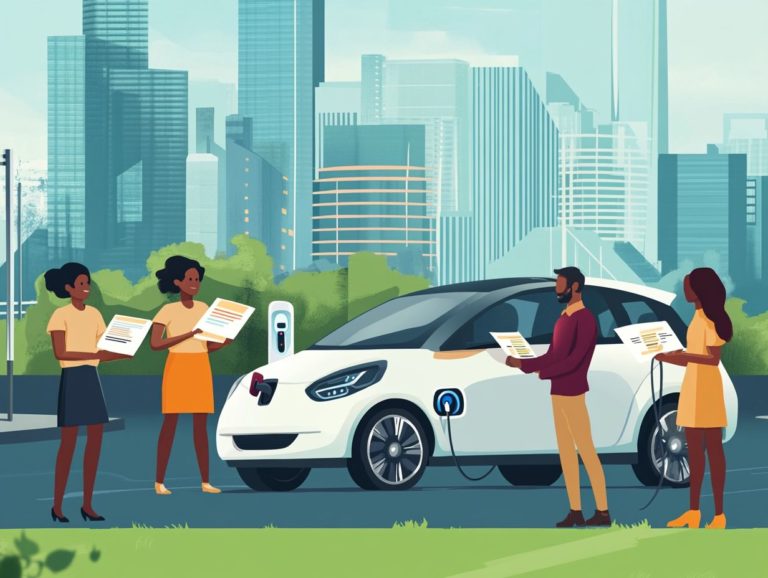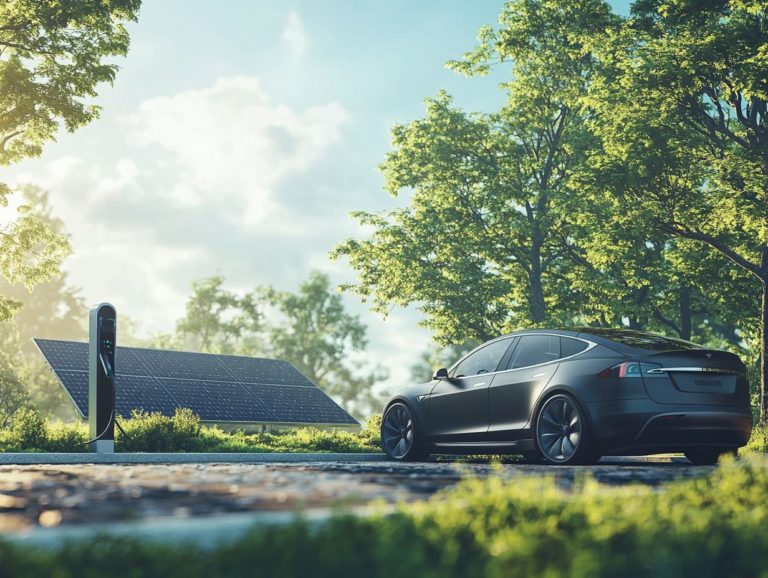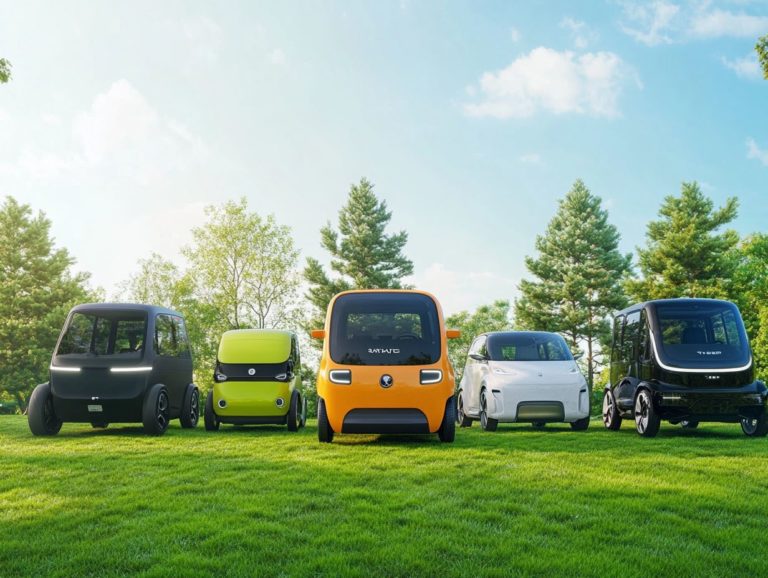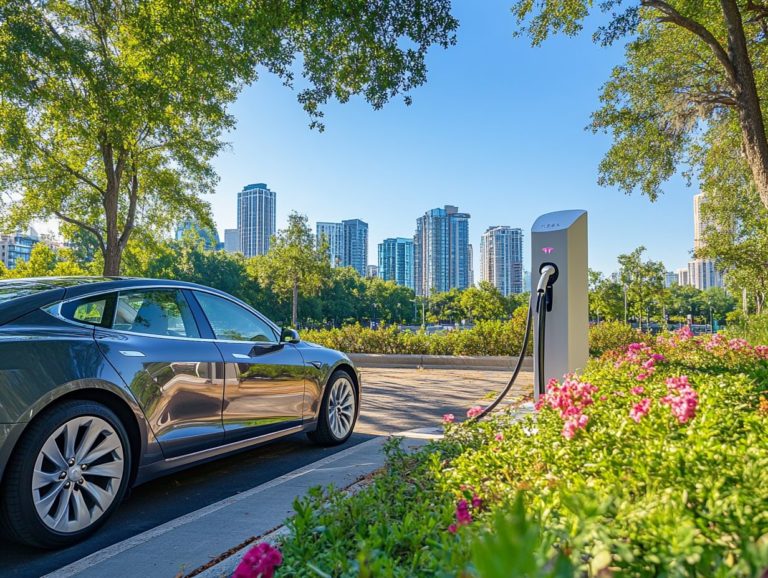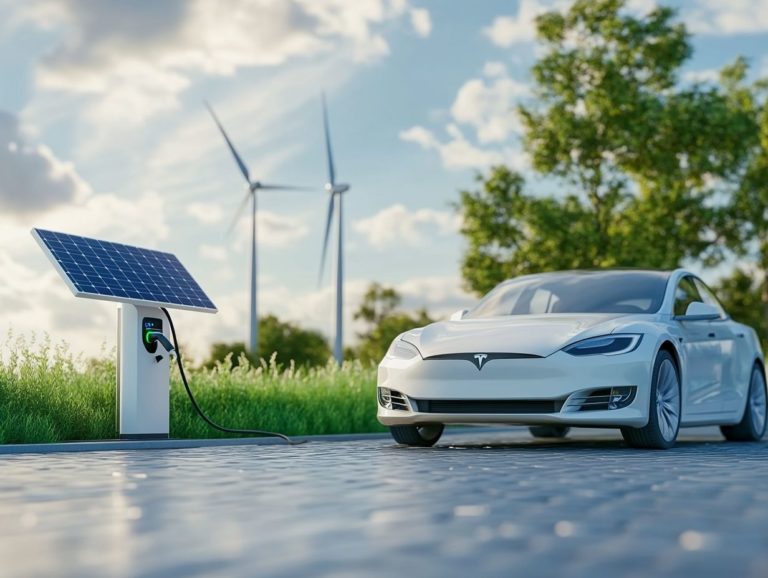Electric Vehicles and Their Impact on Climate Action
Electric vehicles (EVs) are changing how we think about transportation. They offer an eco-friendly alternative to traditional gasoline cars amid growing concerns about climate change and air quality.
This article explores the environmental benefits of EVs, like lower carbon emissions and better air quality. It also highlights economic perks, such as fuel savings and tax incentives.
Challenges exist, such as charging infrastructure and initial costs. We will discuss practical solutions to make EVs more accessible.
Get ready to discover how electric vehicles can make a positive impact on our world!
Contents
- Key Takeaways:
- What are Electric Vehicles?
- Environmental Benefits of Electric Vehicles
- Economic Benefits of Electric Vehicles
- Barriers to Widespread Adoption of Electric Vehicles
- Solutions to Overcome Barriers
- Innovations in Battery Technology
- Frequently Asked Questions
- What are electric vehicles and how do they impact climate action?
- What are the main benefits of electric vehicles?
- How do electric vehicles compare to traditional gasoline vehicles in terms of performance?
- Do electric vehicles have any limitations?
- What role do electric vehicles play in reducing greenhouse gas emissions?
- How are governments and organizations promoting the use of electric vehicles?
- Frequently Asked Questions
Key Takeaways:
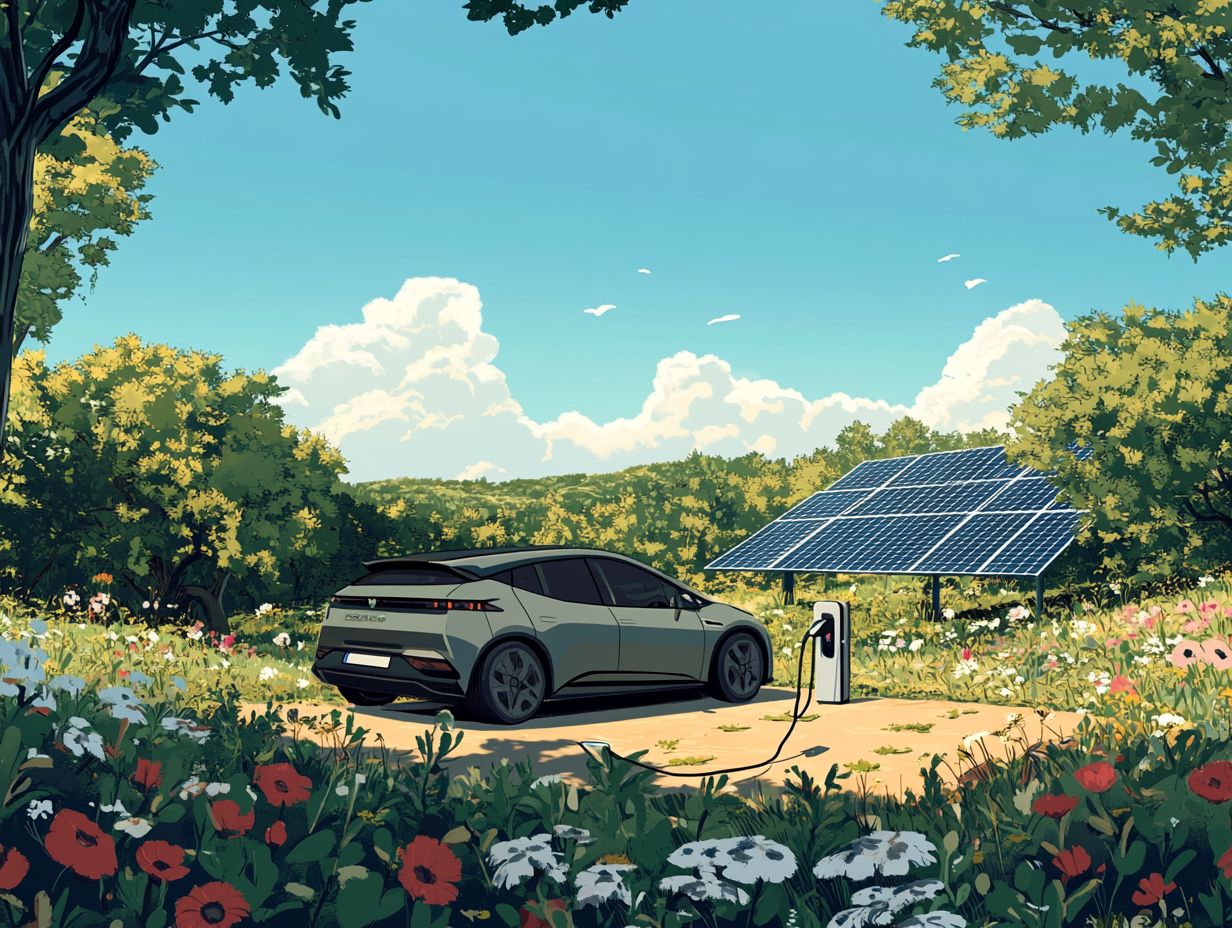
- Electric vehicles play a crucial role in reducing carbon emissions and improving air quality, making them a vital tool in the fight against climate change.
- Beyond environmental benefits, electric vehicles also offer economic advantages such as cost savings on fuel and potential government incentives and tax credits.
- To overcome barriers to widespread adoption, solutions such as investing in charging infrastructure and advancing battery technology are necessary for electric vehicles to become more accessible and affordable for consumers.
What are Electric Vehicles?
Electric vehicles (EVs) represent a revolutionary shift in transportation, providing you with a compelling alternative to traditional petrol vehicles that rely on internal combustion engines (ICE). By harnessing renewable energy, these electric cars significantly reduce carbon emissions, playing a crucial role in mitigating climate change and enhancing air quality. Furthermore, how electric vehicles can influence policy change is becoming an important conversation as we move towards a more sustainable future.
As more consumers and manufacturers embrace this technology, the EV market is flourishing, featuring a diverse array of models like the Tesla Model 3, Nissan Leaf, and Peugeot e-208. Each showcases remarkable advancements in battery capacity and energy efficiency.
These innovative vehicles operate through electric motors powered by energy stored in batteries, setting them apart from ICE vehicles that rely on fossil fuels. This transition not only boosts fuel efficiency but also aligns seamlessly with the global movement toward sustainable transportation options. Popular models like the Ford Mustang Mach-E and Chevrolet Bolt EV illustrate the market’s diversification, each contributing to an important dialogue about sustainability and eco-friendliness.
With improved charging infrastructure and enticing government incentives, your adoption of EVs marks a pivotal step toward a cleaner future, paving the way for more environmentally responsible transportation solutions.
Environmental Benefits of Electric Vehicles
The environmental benefits of electric vehicles (EVs) are indeed profound. They significantly reduce greenhouse gas (GHG) emissions and overall pollution compared to traditional petrol vehicles.
Lifecycle analyses reveal considerable drops in carbon emissions. The shift to electric vehicles is not just a choice; it aligns with global climate goals and understanding electric vehicles’ carbon offset potential as part of sustainable development initiatives.
Embracing EVs positions you at the forefront of a necessary transformation for a cleaner, greener future.
Reducing Carbon Emissions
Electric vehicles are pivotal in the quest to reduce carbon emissions, especially as the world transitions from carbon-heavy fossil fuels to more sustainable energy sources. Understanding electric vehicles and their role in energy policy is vital for reducing carbon emissions and combating climate change.
Since EVs run on electricity rather than gasoline or diesel, they inherently reduce greenhouse gas emissions particularly when charged with renewable energy sources like solar, wind, or hydroelectric power. By prioritizing these green options for charging, you can significantly minimize the overall emissions associated with electric vehicle usage.
By embracing electric vehicles, you align yourself with international climate agreements, strengthening global efforts to achieve net-zero targets. The ripple effect of reducing reliance on traditional fuels highlights the transformative potential of EVs in urban transport and beyond, encouraging cities and nations to invest in the infrastructure needed for cleaner mobility solutions.
Improving Air Quality
The introduction of electric vehicles has a direct and positive impact on urban air quality. They significantly lower pollution levels linked to traditional petrol vehicles, showcasing the future of sustainable mobility and electric vehicles.
By minimizing harmful emissions, EVs help to cool down cities and create healthier environments for everyone. As these vehicles gradually replace fossil fuel-powered cars, you can expect to see a remarkable decline in nitrogen oxides and particulate matter pollutants that contribute to respiratory issues and other health complications.
This shift enhances air quality and promotes better public health outcomes, especially for vulnerable populations like children and the elderly. With the gradual phasing out of combustion engines, urban landscapes can transform into more livable spaces, fostering green areas and encouraging outdoor activities.
These improvements lead to fewer hospital visits and reduced healthcare costs, marking a significant stride toward sustainable urban living while effectively tackling pressing environmental challenges.
Economic Benefits of Electric Vehicles
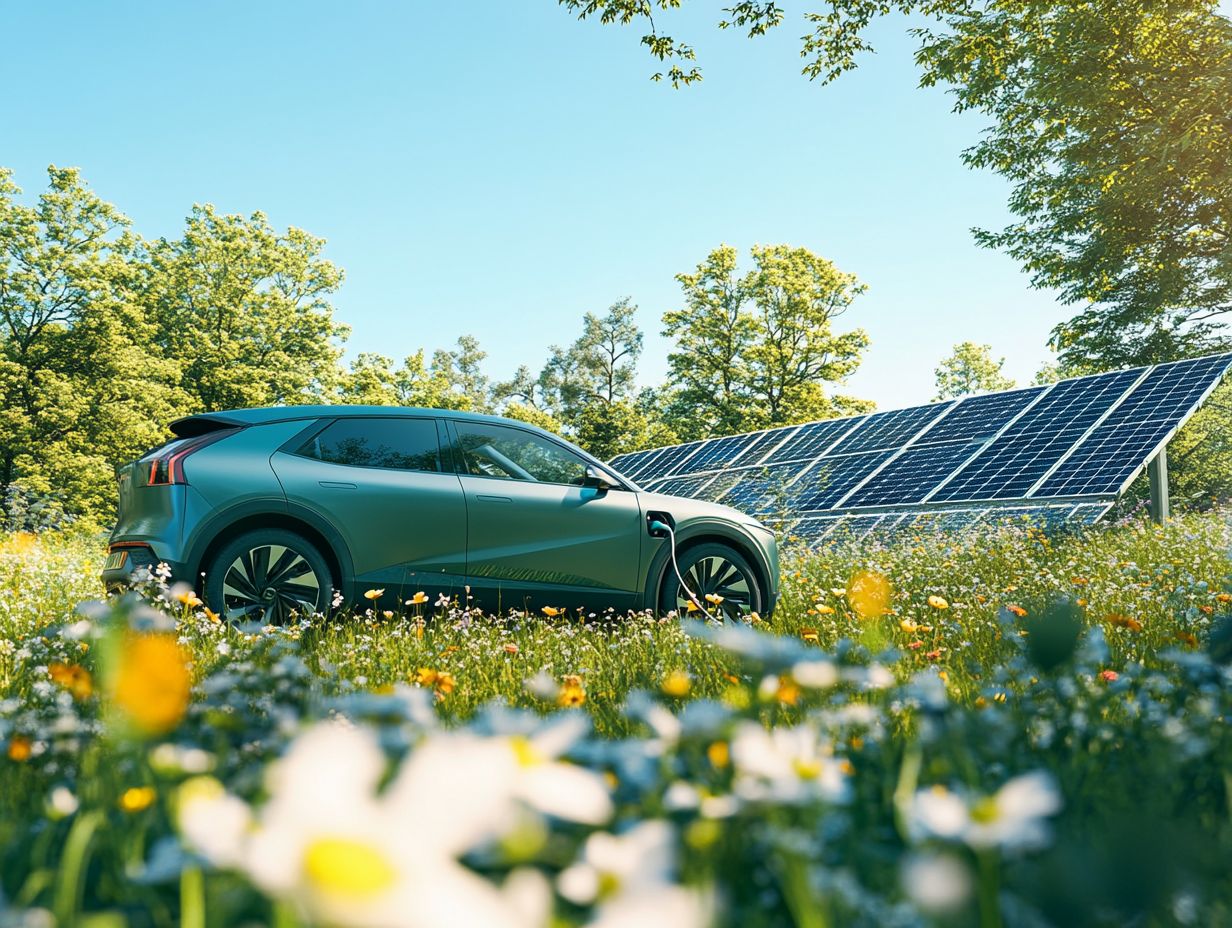
Electric vehicles (EVs) offer a wealth of economic benefits that can enhance your financial landscape. From notable savings on fuel costs to government incentives and tax credits, transitioning to EV ownership becomes a more attainable goal.
By examining the cost considerations, you can uncover both immediate and long-term financial advantages, thanks to reduced energy consumption and lower maintenance expenses.
Saving on Fuel Costs
One of the most enticing benefits of electric vehicles is the remarkable potential for substantial savings on fuel costs. Since EVs are typically more energy-efficient than their petrol counterparts, this efficiency leads to lower operating expenses throughout the vehicle’s lifespan.
For budget-conscious drivers, EVs can be an incredibly appealing choice. When you look at the cost per mile, you’ll find that electric vehicles usually require only a fraction of what petrol vehicles spend on fuel, especially given the unpredictable nature of gasoline prices.
As the world shifts toward renewable energy sources, the cost to charge your EV is likely to drop even further, amplifying your savings. Plus, with fewer moving parts and less wear and tear on engines, maintenance costs are generally lower, adding to your overall lifetime savings.
Switching to electric mobility is a smart move that benefits both your wallet and the planet! It has a positive impact on the environment, creating a win-win scenario for both you and society at large.
Government Incentives and Tax Credits
Government incentives and tax credits play a crucial role in amplifying the economic advantages of electric vehicles. They effectively foster EV adoption among diverse demographics. These financial incentives can significantly reduce the initial purchase price, making electric vehicles more attainable for you and a broader audience.
Programs at both federal and state levels present a range of incentives, including tax credits that can reach as high as $7,500 per vehicle. This enhances affordability and alleviates the often higher upfront costs associated with purchasing an EV.
Recent studies reveal that regions adopting these incentives experienced a 25% increase in EV sales, showcasing how impactful they are in shaping consumer behavior. Certain states go even further, offering rebates and reduced registration fees to promote eco-friendly choices.
With such substantial backing, it s evident that these financial measures are essential in accelerating the shift toward electric mobility. Don t miss out on the savings and health benefits make the switch today!
Barriers to Widespread Adoption of Electric Vehicles
Despite the increasing enthusiasm surrounding electric vehicles (EVs), several significant barriers stand in the way of their widespread adoption. Issues such as insufficient charging infrastructure, cost considerations, and limited availability of resources necessary for battery production can complicate the journey toward a fully electric future.
Tackling these challenges is crucial for paving the way to a more seamless transition to electric mobility.
Charging Infrastructure
A robust charging infrastructure is essential for your smooth switch to electric vehicle ownership, as it directly influences the convenience and accessibility of charging options. If there aren t enough charging stations, you might hesitate to make the switch, limiting the potential of electric cars in urban settings.
Currently, your charging choices range from home chargers to public fast chargers and workplace charging stations, each tailored to meet specific needs based on your location. Urban areas often face challenges, such as warm city areas, which can worsen temperature extremes and affect both battery performance and your overall experience.
The uneven distribution of charging facilities in cities can create anxiety about finding accessible charging points, acting as a significant barrier to embracing EV technology. It’s exciting to tackle these challenges and improve the availability of electric vehicles, contributing to reducing carbon emissions in densely populated regions.
Cost and Availability
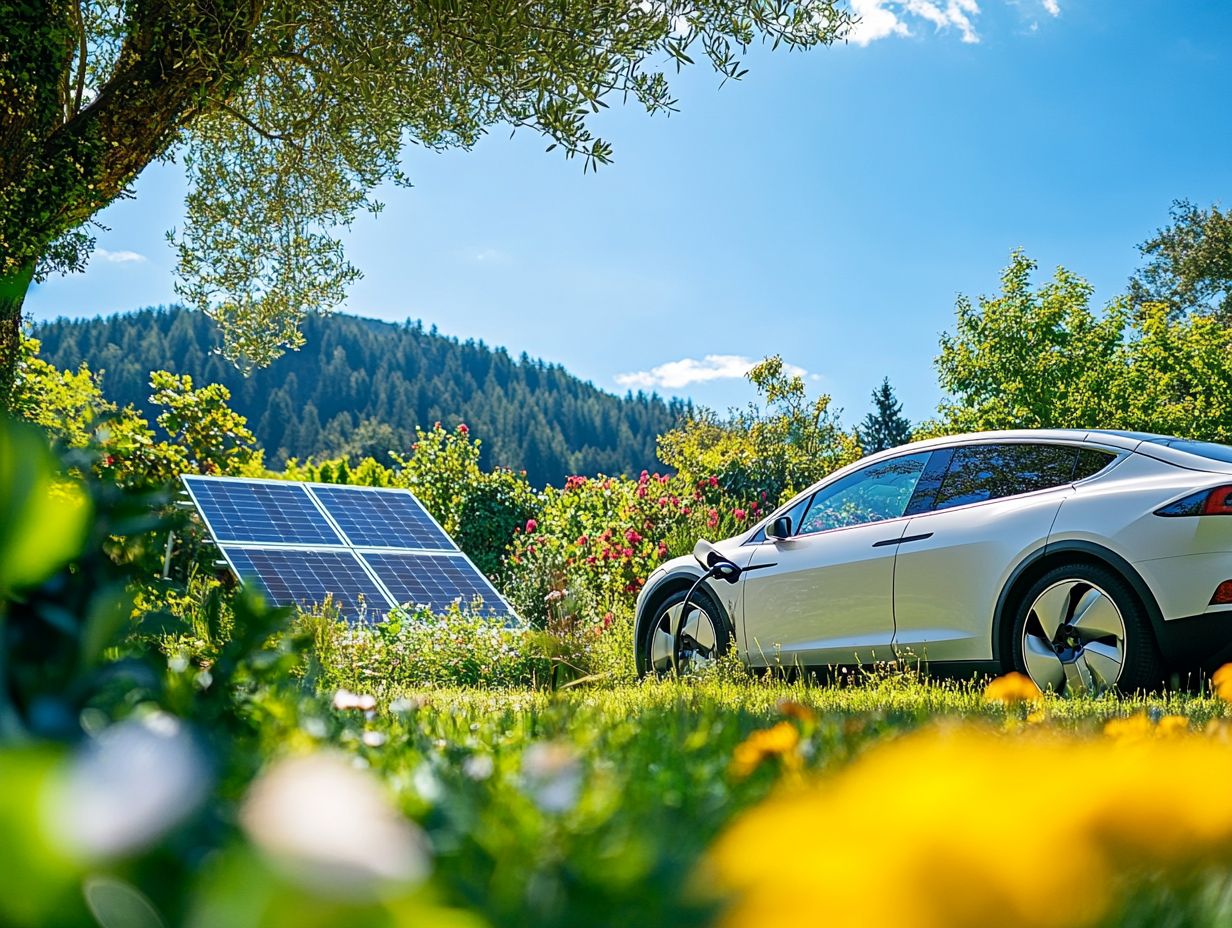
The cost and availability of electric vehicles are crucial elements shaping your decision to adopt this technology. If you re eyeing an electric car, the high upfront costs and limited options can be quite off-putting. Resource challenges in battery production can also impact the supply and affordability of these vehicles.
You may find yourself weighing the long-term savings from lower fuel and maintenance costs against the initial financial burden. Ongoing expenses like insurance and charging infrastructure along with potential government incentives, are key factors in your decision-making process.
With an expanding range of models available, from budget-friendly choices to luxury options, you ll need to navigate the pricing variability influenced by the availability of raw materials.
As manufacturers grapple with sourcing critical components like lithium and cobalt, those fluctuations can drive up production costs, which ultimately find their way to you, the consumer.
Solutions to Overcome Barriers
To transcend the barriers hindering electric vehicle adoption, it’s essential for you to advocate for solutions like investing in charging infrastructure and embracing innovations in battery technology.
Government initiatives are equally pivotal, as they significantly contribute to facilitating these advancements and creating a conducive environment for the widespread adoption of diverse electric vehicle models.
Investment in Infrastructure
Investment in infrastructure is essential for you to fully embrace electric vehicles. Establishing widespread charging stations ensures that every EV owner has convenient access. When governments fund these projects, they significantly boost the adoption rate of electric vehicles in your community.
These initiatives not only offer financial incentives but also create regulatory frameworks that encourage private sector investment in EV infrastructure. By supporting the installation of fast-charging units in strategic locations like shopping centers, highways, and urban areas these programs tackle one of the biggest hurdles to EV adoption: worry about running out of charge.
As renewable energy sources become part of these charging networks, you gain access to more sustainable options that can help reduce your overall carbon footprint. Ultimately, when communities commit to solid charging infrastructure, they create an environment where electric vehicles can thrive, making them a more viable choice for everyone.
Let s work together to build a better charging network!
Innovations in Battery Technology
Innovations in battery technology are transforming the electric vehicle industry, elevating battery capacity, performance, and sustainability to new heights. Overcoming resource challenges in battery production is crucial for ensuring that electric vehicles become a viable option for mainstream transportation.
As you navigate the increasing demand for eco-friendly transportation, breakthroughs in solid-state batteries and advanced lithium-ion technologies reduce charging times and enhance energy density. These upgrades not only improve electric vehicle efficiency but also minimize the environmental impact linked to traditional battery materials.
Strategies like recycling and sourcing ethical materials are essential in addressing the scarcity of vital resources. Embrace these innovations now to lead the automotive sector in tackling sustainability challenges head-on! This paves the way for a future where electric vehicles are not just a practical choice but a fundamental part of our dedication to a greener planet.
Frequently Asked Questions
What are electric vehicles and how do they impact climate action?
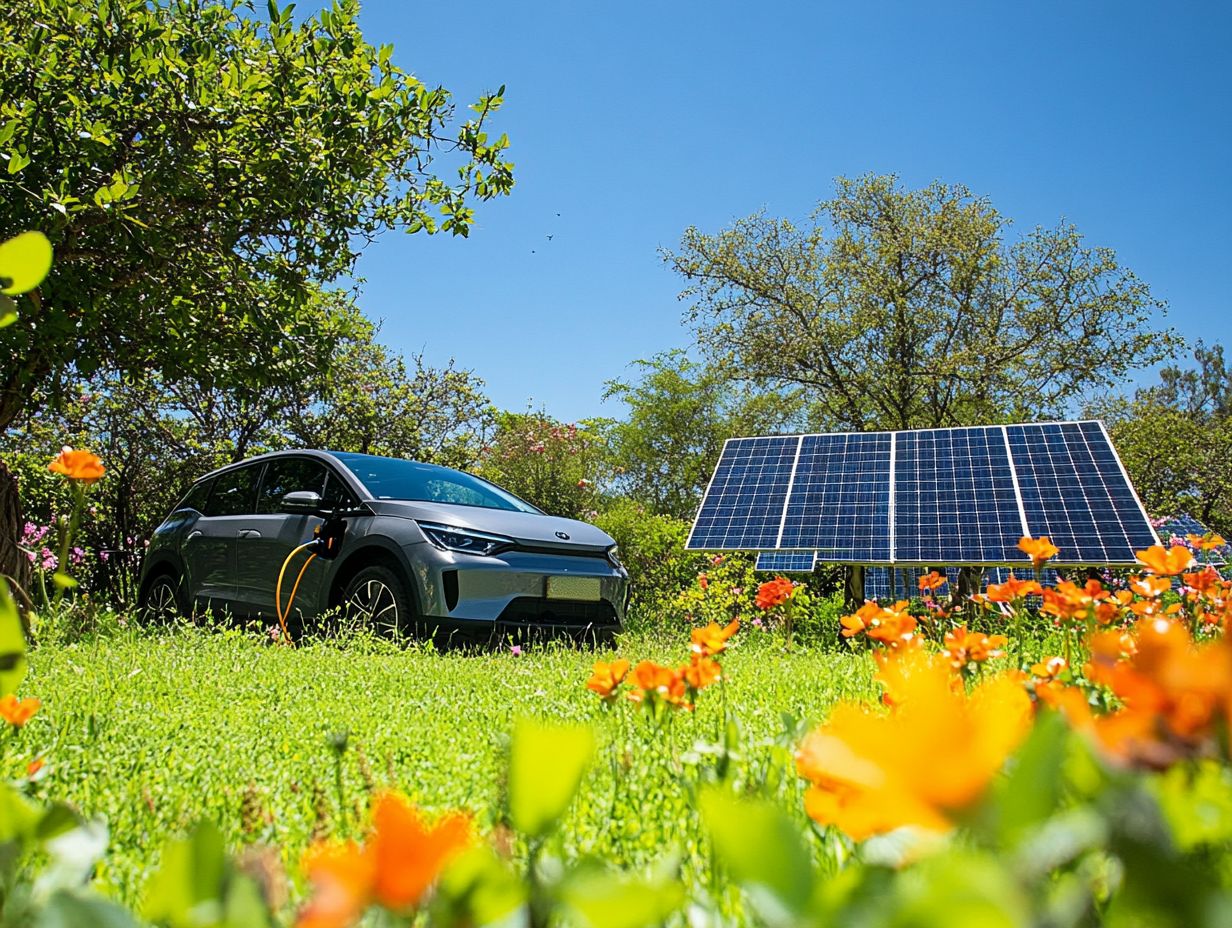
Electric vehicles are cars, trucks, and other vehicles powered by electricity rather than gasoline or diesel. Their impact on climate action is significant, as they produce zero emissions and help reduce the use of fossil fuels. Understanding the role of electric vehicles in climate change highlights their importance in combating environmental issues.
What are the main benefits of electric vehicles?
Electric vehicles offer exciting benefits that you’ll love! They reduce emissions and support climate action, playing a crucial part in combating climate change. They also have lower operating costs, require less maintenance, and can be powered by renewable energy sources.
How do electric vehicles compare to traditional gasoline vehicles in terms of performance?
Electric vehicles have faster acceleration, smoother driving, and lower noise levels than gasoline counterparts. They also last longer because they have fewer moving parts.
Do electric vehicles have any limitations?
While electric vehicles have many benefits, they do have some limitations, such as limited driving range and longer charging times compared to filling up a gas tank. However, technology is constantly improving these areas.
What role do electric vehicles play in reducing greenhouse gas emissions?
Transportation is one of the largest sources of greenhouse gas emissions. Electric vehicles significantly reduce these emissions by eliminating the use of fossil fuels. Understanding the impact of climate change on EV adoption rates makes them a crucial element in climate action and combating climate change.
How are governments and organizations promoting the use of electric vehicles?
Many governments and organizations are implementing incentives and policies to encourage the adoption of electric vehicles. These include tax credits, subsidies, and infrastructure development for charging stations.

